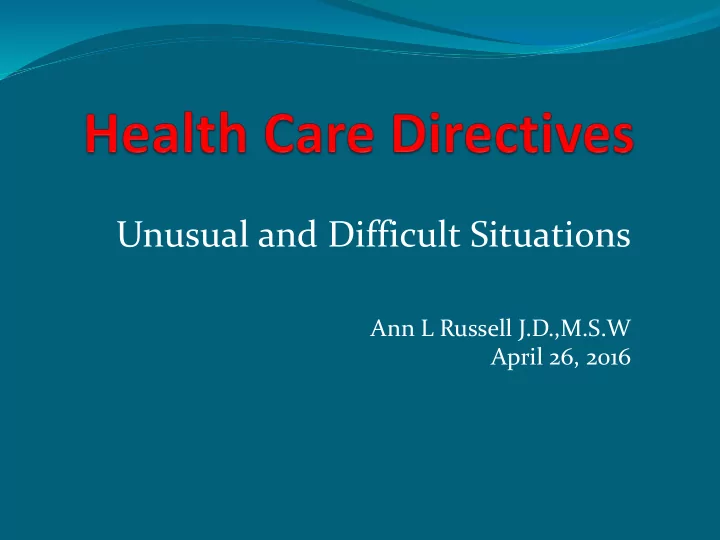

Unusual and Difficult Situations Ann L Russell J.D.,M.S.W April 26, 2016
Cruzan v. Director, MO Dept, of Health Cruzan v. Director, Missouri Department of Health , 497 U.S. 261 (1990), was a landmark United States Supreme Court case. In a 5-4 decision, the Court affirmed what state cases on end of life had developed: Autonomy (to refuse to be touched) is absolute if pt has capacity Surrogates can exercise the autonomy of pts w/o capacity Surrogates must Substituted Judgment or sometimes best interests No difference between withholding and withdrawing treatment Nutrition and hydration are medical treatment
However: the earlier ruling of the Supreme Court of Missouri had upheld the state position that it was acceptable to require “clear and convincing evidence" of a patient's wishes for removal of life support…e.g. in writing. So the Cruzans “lost” A significant outcome of the case was the creation of advance health directives and Patient Self Determination Act (1990)
Minn. Stat 145C: To be legally sufficient a directive must: (1) be in writing; (2) be dated; (3) state the principal's name; (4) be executed by a principal with capacity to do so ; (5) contain verification of the principal's signature either by a notary public or by two witnesses as provided under this chapter; and (6) include either a health care power of attorney, a health care instruction , or both.
DISCLOSURE: My BIAS Advance Directives have not entirely solved the problem. Have tried to discern meaning out of hundreds of directives…imagine a practice in which you specialized in holographic wills.
They are all unique and difficult WHY ? The statute itself creates issues. They are NOT true legal documents They often are poorly written because there is no guidance. State “Wishes” without enough knowledge. Agent ‘s role often unclear Cannot compel physician to act against her ethics. Require interpretation by a physician .
So - often of limited usefulness… Not done, not done recently or not complete Forms/decisions not understandable Not applicable to some medical decisions Focus on treatments, not values/wishes Not discussed with agent Not available when needed Not followed or can’t be followed by a provider
But we all want to avoid Dr House …because physicians can’t script the perfect outcome .
HEALTH CARE INSTRUCTION? Just how do you do this with no medical knowledge of your own future circumstance…not well! Rather think about what matters to you…relative independence, cognitive capacity, simple pleasures, freedom from pain, relationships etc. But many find life worth living even as world narrows Certainly not a checklist
Actual Checklist from a Directive
Directives unhelpfully often state: • No ventilator • No feeding tube • No rehab • No nursing home • But I do want CPR! • Or request everything because of mistrust of doctors (unless I have Alzheimer's)
Problem Situations The agent with an agenda (fire victim) The dependent principal The 15 page directive following in pt psych discharge Conflicting wishes…orthodox daughter Suicide accompanied by directive God will decide I could never decide to let Mom go 145C.15
Power of Attorney ? Term is persistently misused because it: Conflicts with Minn. Stat. 523.23 which “ conveys a ll of the powers listed in (A) through (M) above and all other matters, but in instructions to principal states… THIS POWER OF ATTORNEY DOES NOT GRANT ANY POWERS TO MAKE HEALTH CARE DECISIONS FOR YOU. TO GIVE SOMEONE THOSE POWERS, YOU MUST USE A HEALTH CARE DIRECTIVE THAT COMPLIES WITH MINNESOTA STATUTES, CHAPTER 145C But term persists and misleads Principal and Providers…creates a mess.
The Vitalist Agent … 145C.15 DUTY TO PROVIDE LIFE-SUSTAINING HEALTH CARE. (a) If a proxy acting under chapter 145B or a health care agent acting under this chapter directs the provision of health care, nutrition, or hydration that, in reasonable medical judgment, has a significant possibility of sustaining the life of the principal or declarant, a health care provider shall take all reasonable steps to ensure the provision of the directed health care, nutrition, or hydration if the provider has the legal and actual capability of providing the health care either itself or by transferring the principal or declarant to a health care provider who has that capability. Any transfer of a principal or declarant under this paragraph must be done promptly and, if necessary to preserve the life of the principal or declarant, by emergency means. This paragraph does not apply if a living will under chapter 145B or a health care directive indicates an intention to the contrary.
Honoring Choices…why? Twin City Medical Society Clear Instructions Help in starting conversations with family (kids particularly) Cross cultural barriers An enormous amount of help in thinking about values
Emphasizes that a Directive is really only useful when its completion is combined with a focused conversation with loved ones .
Honoring Choices Original Health Care Directive (8 pages long) - the comprehensive document to fully outline your choices and preferences regarding care to be given *NEW* Short Form Health Care Directive (2 pages long) - a quick document to be completed if the original directive is not right for you at this time
POLST Form When future medical changes are likely Close to the end of a terminal Can be much more specific about treatments: Hospitalization Ventilation Artificial Nutrition and Hydration Antibiotics Cardio Pulmonary Resuscitation
And by the way… Often providers can indentify a patient’s wishes without a directive. Providers are grateful that Minnesota does not have a statute which governs who can speak for the patient when there is no directive. Start with relatives but sometimes ( absence, distance, estrangement, disinterest) not as useful as a close friend, or nursing home staff. Best Wishes are always a part of any decision.
Recommend
More recommend